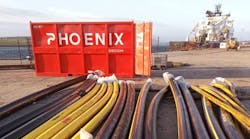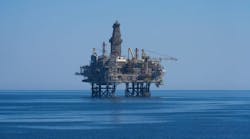Standoff in the Mideast
Middle East national oil and gas producers, proprietors over 70-80% of known global crude oil reserves, are watching as their fields mature, reserve volumes shrink, and production peaks. Their patience is admirable, and their default strategy - postponing re-development - appears to rest on solid ground - for the moment.
What may undermine that strategy is a surge in global oil demand - exceeding 3% - which would be unexpected, but not entirely unreasonable, given a confluence of global events. A hike in global oil demand also would undercut OPEC's second strategy - minimizing non-OPEC market response.
Why have most Mideast countries postponed matching up with major oil producers who possess much of the technology and financial wherewithal to re-develop fields? The simple answer is that Mideast countries are enjoying revenues from strong oil prices. But, there are other considerations.
Size and capability of prospective partners could be an issue, but the Exxon-Mobil, Total-Elf, and BPAmoco combinations appear to have answered concerns. But size isn't just about capacity; it's about capital. And here is where the trail of failed discussions begins to grow warm.
The collective capital needed for Mideast re-development will range up to $50 billion, especially if remediation approaches original wellbore quality levels. The Mideast nations could probably tap about $15-20 billion domestically and borrow another $10 billion against outside investments. The remainder would have to come from the multinational partners, who would then have two choices: (1) draw down other global investments in order to fund re-development. (2) borrow the money, using their global facilities and non-Mideast production as collateral.
In making the first choice, the selected producers could become precariously dependent on one or more Mideast countries for production feedstocks. In the second, leveraging assets to fund projects where facilities and production have been nationalized in the past is not a comforting thought - particularly for long-term projects. Whereas Western countries were willing to protect access to oil supplies 10 years ago, conditions have changed. In fact, the motive behind the West's global diversification of supply was to counter the risk of oil strangulation in any part of the world.
Multinational producing partners can't be overly flexible either. Faring better under higher oil prices, they aren't ready to commit to much without an equity position. But equity arrangements present serious cultural and political problems for Mideast governments.
How much longer the standoff continues will depend on OPEC's inability to match production output to global oil demand growth, and in the continuance of an uncomfortable dichotomy - high oil prices and subdued non-OPEC activity.
Conduit and content
There are conduits (vessels, routers - choose a term), and there is content. Without valued content, conduits are useless, however fast, convenient, and aesthetic they appear to be. When the excitement over a newer, cheaper, faster, higher quality conduit wears off, we are left with what we sought in the beginning - content. There are no revolutions surrounding content - only qualitative issues.
The Internet is a quantum leap in conduit technology. The bits and bytes not involved in routing and storage are content. Content on the Internet varies highly in quality. Many Internet sites are developed around low value text or data that possess the critical key words designed to pull in viewers. Yet, viewers are intrigued with the availability of difficult-to-access information that is free, or at least depends on non-user subsidies. Content fatigue hasn't set in - yet - but that hurdle may be fast approaching.
The collective aggregation of data on the web is expanding faster than web sites and users, but as long as technology can move content in reasonable time, there will be no volume penalties applied to the Internet. In addition, e-commerce consumer and business-to-business sites have encouraged the development of data aggregation and evaluation tools for viewers.
The question of Internet content value has taken a back seat to the conduit. But that old cliche - you get what you pay for - may yet come home to roost. Internet system companies make money on the conduit by improving the system and delivering viewers; the rest of us - when the bells and whistles fade away - must live by the quality of accessed or posted content. It helps to keep the two in focus, and in proportion.
Readers wishing to respond to issues presented on this page or elsewhere in Offshore, or offer authored articles or article suggestions, should contact the editor by E-mail ([email protected]) or Fax (1-713-963-6296).



